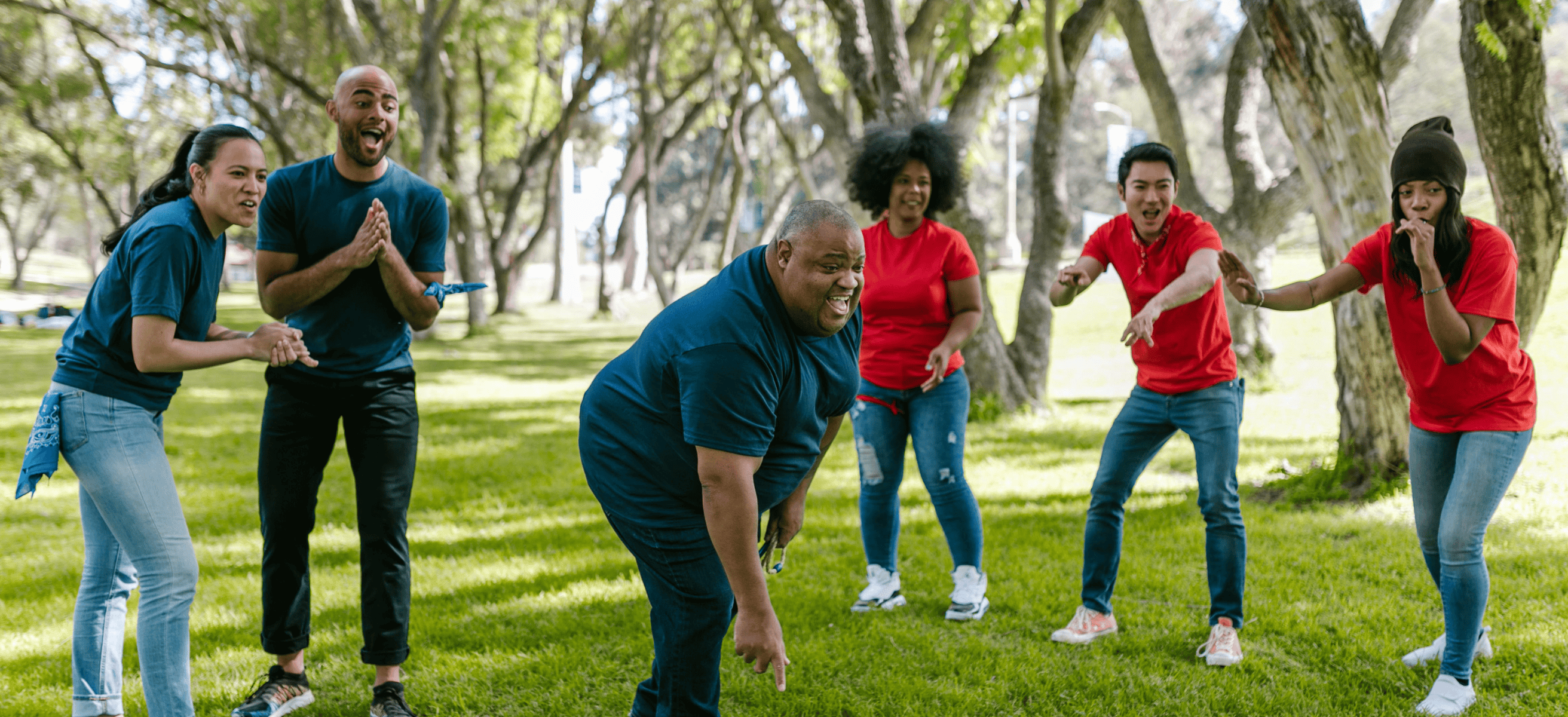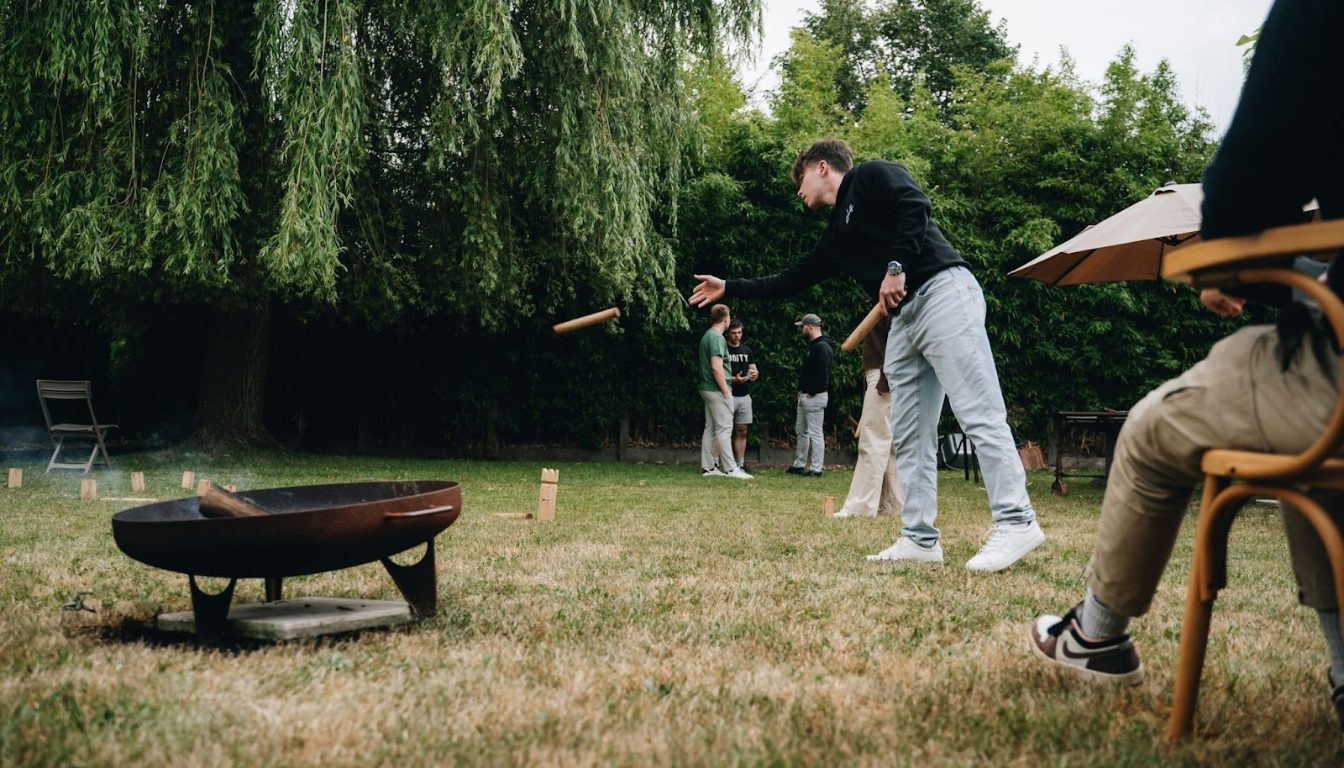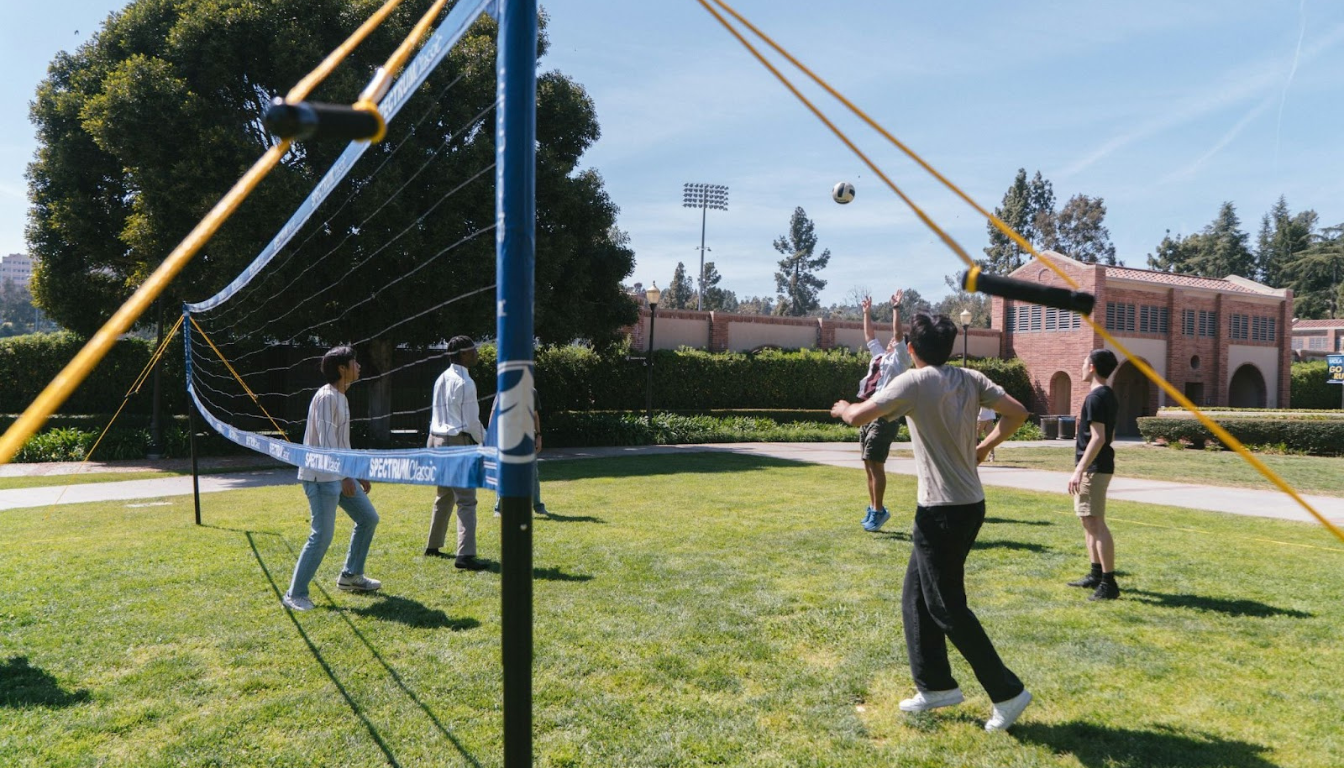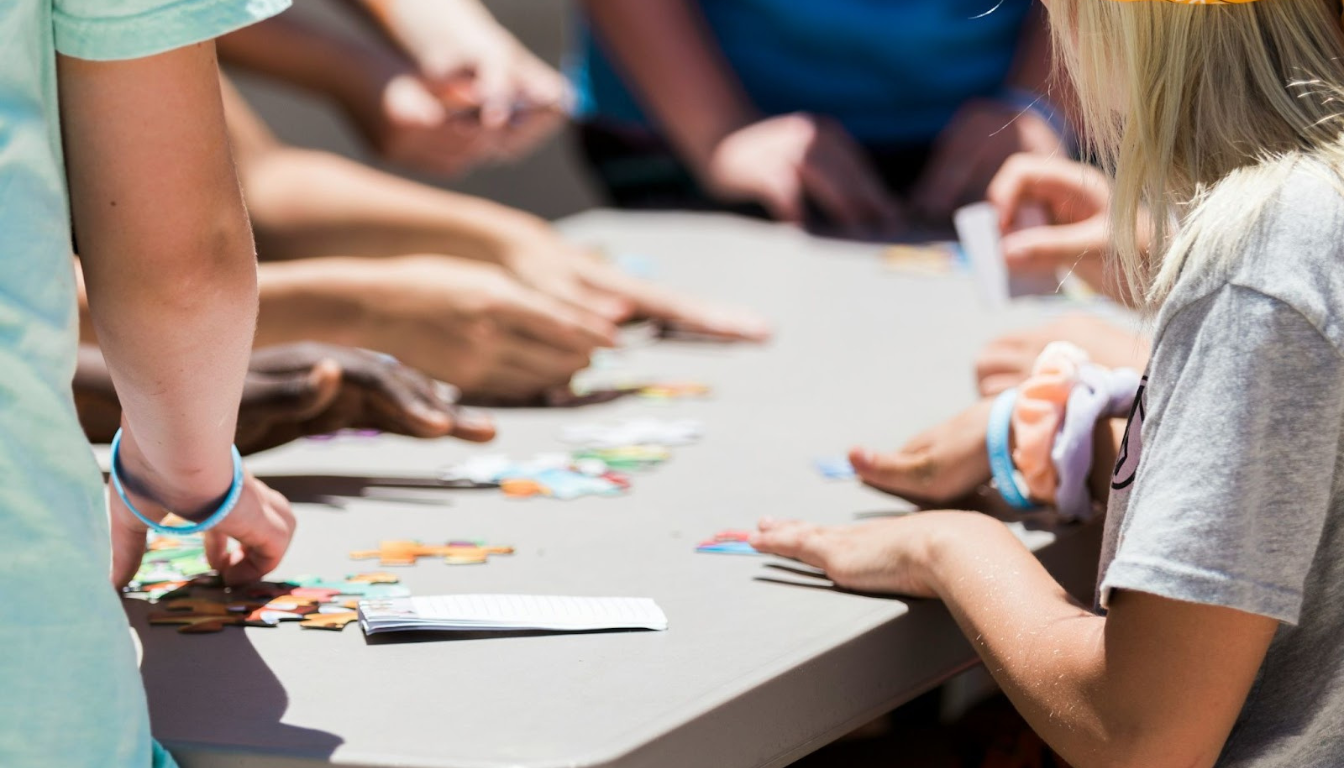Top 17 Retreat Games to Boost Team Spirit and Collaboration

Searching for the best retreat games to build team spirit and collaboration? Look no further. In this guide, discover 17 top-rated games that will enhance team-building, improve communication, and create lasting bonds among your team members. Whether you’re planning icebreakers, problem-solving tasks, or competitive challenges, these games will make your retreat unforgettable.
Key Takeaways
- Team bonding activities enhance trust, collaboration, and morale, leading to stronger team cohesion and improved performance.
- Incorporating a variety of games, including icebreakers, outdoor activities, and problem-solving tasks, ensures all team members are engaged and can form deeper connections.
- Strategically selecting retreat games that align with team dynamics and objectives is essential for maximizing the effectiveness of team-building exercises.
Fun Retreat Games for Team Bonding

Team bonding games are crucial for building trust and collaboration among team members. Beyond just fun, these activities allow team members to understand and appreciate each other’s unique strengths, leading to memorable experiences and stronger connections that enhance team cohesion.
Including a range of activities in your team bonding repertoire—such as icebreakers, problem-solving tasks, and both indoor and outdoor games—can significantly enhance team dynamics. For example, a scavenger hunt can encourage teamwork and problem-solving, while escape rooms can test and improve communication skills.
These fun activities not only provide a much-needed break from the daily grind but also help team members relax and unwind, contributing positively to employee morale. For example, incorporating educational tours into your team retreat activities can enhance communication skills while offering enjoyable interactions that contribute positively to team bonding during the team retreat. Additionally, team members can spend time engaging in these activities together.
Overall, engaging in team-building games can significantly improve employee morale and create long-lasting team connections within the entire group, improving team cohesion. When team members return to their regular work environment, they bring with them a renewed sense of camaraderie and a deeper understanding of their colleagues, which enhances overall team performance.
Icebreaker Activities for Retreats
Icebreaker activities are a great way to kick off any retreat. These games are effective for both new and established teams, helping to break down barriers and encourage open communication. By using icebreakers, you can enhance attendee comfort and openness, facilitating better team dynamics during the retreat.
Popular icebreaker activities include:
- The Low-tech Social Network, which helps introduce participants by visualizing their connections.
- The ‘Just the Facts’ game, which energizes small groups by reinforcing knowledge and sharpening quick-thinking abilities.
- The 5-4-3-2-1 Grounding Technique, which encourages participants to engage their senses and be present, adding a mindfulness twist.
A welcome party is another excellent icebreaker activity that helps attendees feel comfortable at the retreat. It’s important to select effective icebreakers that feel worthwhile and appropriate for the group to ensure everyone participates and benefits from the activity. For instance, large group icebreakers can build rapport, boost participation, and create a positive atmosphere.
Starting your retreat with icebreakers sets a positive tone for the rest of the activities. These games strengthen coworker bonds, stimulate brainstorming, and create a sense of inclusivity. By the end of the retreat, your team will be more connected and ready to tackle challenges together.
Outdoor Games for Energizing Teams

Outdoor games offer a refreshing change of pace and provide an excellent opportunity for teams to connect in enjoyable settings away from the office. These team games enhance team interaction, provide fresh air, and reduce screen distractions, making them ideal for energizing teams.
Hiking is a fantastic large groups retreat activity that promotes fitness and allows teams to enjoy time together in nature. Other popular outdoor games include scavenger hunts, field days, and rope courses, all of which foster teamwork while participants enjoy the fresh air. For instance, fun team retreat ideas like Capture the Flag promote strategic thinking as teams work to outsmart each other. Incorporating group retreat activities can further enhance these experiences.
Bike rides offer a balance of exercise and social interaction among team members. Obstacle courses, on the other hand, encourage teams to work together to overcome physical challenges in a fun environment. Paintball is another exciting option that fosters a sense of competition while requiring teamwork to achieve objectives.
Outdoor team-building exercises are fun and effective in enhancing team dynamics. They encourage collaboration in new ways, build stronger relationships, and help new team members form teams to return to work with a renewed sense of unity and purpose through a team building exercise and a team building activity.
Indoor Team Building Games

Indoor team-building games enhance creativity, problem-solving, and communication among team members. These activities are perfect for any weather and can be tailored to fit your team’s needs.
One popular indoor game is the ‘Egg Drop’ activity, where teams construct a protective device for an egg using unconventional materials, enhancing creativity and decision-making. Another engaging option is the ‘Marshmallow Spaghetti Tower’ game, which requires teams to collaborate using limited resources to build the tallest structure.
The desk item marketing exercise challenges teams to market everyday objects creatively, promoting teamwork and problem-solving. In the ‘Barter Puzzle’ activity, teams must negotiate and trade pieces to complete their jigsaw puzzles, enhancing collaboration.
Indoor games like the ‘Human Knot’ exercise, where participants physically untangle themselves while maintaining communication, emphasize teamwork and adaptability. These activities not only provide a fun and engaging break from work but also significantly improve team dynamics and cohesion.
Competitive Challenges for Friendly Competition
Competitive challenges are a fantastic way to enhance team spirit and encourage friendly competition among team members. These games typically incorporate elements such as scoring, leaderboards, and performance comparisons, making them exciting and engaging.
One such game is ‘Human Snakes,’ where participants use non-verbal cues to guide blindfolded teammates toward success, enhancing communication and teamwork. Another popular activity is ‘Build A Bridge,’ which challenges teams to construct a weight-bearing bridge from basic materials, fostering creativity and collaboration through fun team building games.
Fantasy football leagues can also enhance team bonding by allowing coworkers to engage in friendly competition over real-life sports. ‘Get Fit’ activities utilize fitness apps to challenge team members on health-oriented metrics, fostering camaraderie and a healthy lifestyle.
Participating in competitive challenges like escape room activities fosters a sense of shared achievement and boosts team morale. These games not only promote teamwork but also induce friendly competition, making them an excellent addition to any team-building retreat.
Creative Thinking Games
Creative thinking games are an excellent way to enhance team creativity and the team’s creativity in problem-solving skills. These activities encourage team members to think outside the box and come up with innovative solutions to challenges.
One such game is the common book journal or scrapbook exercise, which encourages team members to express creativity and collaborate. Another engaging activity is the ‘Classify This’ game, which promotes teamwork and creative thinking by classifying various group games into groups.
The first idea exercise aims to uncover new perspectives and fixes within a brainstorming context, fostering innovation. The ‘Sell It’ game challenges team members to pitch ideas in the first person collaboratively, enhancing creativity and teamwork.
Creative thinking games improve problem-solving skills and foster a collaborative environment where team members contribute their unique strengths towards a common goal. Engaging in these activities enhances creativity and enables teams to find innovative solutions to challenges.
Problem Solving Activities
Problem-solving activities are crucial for enhancing team collaboration and innovation. These games encourage team members to work together to find solutions to complex challenges, improving their problem-solving skills.
One popular fun activity is the ‘What would X do?’ game, which encourages players to solve problems from the perspective of admired figures, fostering innovative thinking. The Egg Drop activity also enhances creativity and decision-making by requiring teams to design a protective structure for an egg using unconventional materials.
The Marshmallow Spaghetti Tower challenge encourages collaboration by tasking teams to build a tower using limited resources. Corporate Escape Room experiences emphasize teamwork in solving puzzles under a time constraint to ‘escape’ the room, fostering communication and problem-solving.
Problem-solving activities enhance team dynamics and improve team members’ critical and creative thinking abilities. Engaging in these activities helps teams develop the skills needed to tackle challenges effectively and collaboratively.
Communication Skills Exercises
Effective communication is crucial for team success, serving as the backbone that supports teamwork and collaboration. Communication skills exercises enhance understanding and collaboration among team members. One such exercise is ‘Back-to-Back Drawing,’ which enhances communication skills by encouraging teams to describe images without naming them, similar to blind drawing.
Another engaging activity is the ‘Mood Pictures’ game, where team members express their feelings through selected images, facilitating emotional connection. The ‘Common Thread’ exercise allows teams to discover shared interests, fostering deeper connections among members. The ‘Zen Counting’ exercise requires participants to cooperate and listen to one another to count without repeating or overlapping, enhancing communication and teamwork.
Communication skills exercises improve team dynamics and foster a positive, productive work environment. Enhanced communication skills help team members work together more effectively and minimize workplace misunderstandings.
Scavenger Hunts for Teamwork

Scavenger hunts are a fantastic way to boost teamwork and problem-solving abilities. These interactive team activities involve clues and challenges that promote critical thinking and collaboration among participants.
Scavenger hunts encourage effective communication and collaboration among team members. As teams navigate through the hunt, they engage in critical thinking and work together to decipher clues and find hidden items, enhancing problem-solving skills and strengthening team bonds.
Scavenger hunts can be personalized to fit the team’s interests or location, making them highly relevant and engaging. For example, company-specific quests can be included to add relevance and foster a deeper connection among team members. Remote teams can also participate in virtual scavenger hunts, ensuring that everyone can join in on the fun, regardless of location.
Incorporating scavenger hunts into your retreat activities can lead to a more engaged and cohesive team. These activities not only provide a fun and interactive way to build teamwork but also help improve critical thinking and problem-solving skills.
Trust-Building Games
Trust-building games are essential for fostering a sense of camaraderie and reliability within teams. These activities create a platform for team members to rely on each other and build strong, trusting relationships.
One popular trust-building activity is the Blindfolded Maze, where one team member guides their blindfolded partner through a maze using only verbal instructions, enhancing trust and communication. Another classic game is the Trust Fall, which involves one participant falling backward into the arms of their teammates, reinforcing reliance on each other.
Blindfolded activities, such as guiding a blindfolded team member through an obstacle course, further build trust and enhance communication skills. Silent Connections is another activity where participants communicate non-verbally to strengthen relationships and mindfulness.
Trust-building games promote positive relationships among team members, creating a more cohesive and supportive team environment. With increased trust, the right team building game can help teams work together more effectively and handle challenges with greater confidence and collaboration. Great team building games can further enhance this process.
Trivia Games for Knowledge Sharing
Trivia games are a fun and engaging way to promote group members knowledge sharing and bonding among team members. These games foster engagement and encourage team members to share their knowledge in a competitive yet enjoyable setting.
Trivia games can be tailored to company culture, enhancing engagement and improving workplace relationships through friendly competition. Themes can range from history and pop culture to company-specific trivia, making the games both educational and entertaining.
Popular trivia games include:
- Office trivia
- TV show trivia
- Game Show Trivia Mania, where teams answer personalized trivia questions to earn points, promoting teamwork and bonding over shared interests
The Ultimate Trivia Showdown offers a unique twist on traditional trivia, making it a memorable and engaging activity for retreats, especially when participants can earn bonus points in a fun way.
Organizing trivia games in both in-person and virtual formats makes them versatile for team engagement, ensuring that all team members can participate, regardless of their location. These games not only promote knowledge sharing but also foster a sense of camaraderie and teamwork among in person teams.
Team Jigsaw Puzzle Challenges
Team jigsaw puzzle challenges are an excellent way to enhance problem-solving abilities and foster collaboration among team members. These activities require team members to think creatively and work together to fit pieces together, creating a shared objective that encourages effective teamwork and communication.
Jigsaw puzzles can be tailored to various skill levels and interests, making them versatile for team-building activities. Working on puzzles together helps establish trust and camaraderie among team members, as they rely on each other’s strengths to complete the building blocks of the challenge.
Puzzle challenges create a collaborative environment where individual strengths contribute to a common goal, enhancing problem-solving abilities and fostering unity. These activities improve team dynamics and provide a fun, interactive way to build teamwork.
By incorporating team jigsaw puzzle challenges into your retreat activities, you can create a more cohesive and collaborative team, ready to tackle any challenge together.
Blindfolded Navigation Games
Blindfolded navigation games are designed to enhance trust, communication, and leadership within teams. These activities require participants to rely on each other for guidance and support, fostering a strong sense of trust and teamwork.
One popular blindfolded navigation game is the ‘Perfect Square’ challenge, where blindfolded participants must communicate effectively to form a square using a rope. Another engaging activity is the ‘Minefield’ game, where one partner guides a blindfolded teammate through a space filled with obstacles using only verbal directions.
The Blindfold Trust Walk Challenge involves blindfolded participants navigating an obstacle course with guidance from teammates, promoting communication and teamwork. These activities help participants develop clear communication skills by requiring them to convey instructions effectively to their teammates.
Blindfolded navigation games not only enhance leadership abilities but also foster a trusting environment within teams. By engaging in these activities, team members can build stronger relationships and improve their communication and teamwork skills.
Escape Room Challenges
Escape room challenges provide a unique and engaging way for teams to bond and enhance their teamwork skills. These activities require teams to work together to solve puzzles and complete challenges within a set time limit, fostering communication and problem-solving capabilities.
Participating in escape room challenges can reveal team members’ strengths and weaknesses, helping to build trust and create shared memories. These activities promote effective interaction and collaboration, making them an excellent addition to any team-building retreat.
By incorporating escape room challenges into your retreat, you can create a fun and interactive environment that enhances team dynamics and problem-solving skills. These activities not only provide a sense of accomplishment but also strengthen team bonds and improve overall teamwork.
Active Listening Exercises
Active listening exercises are designed to enhance communication and understanding within teams. These activities emphasize the importance of fully understanding both verbal and non-verbal communication, fostering a collaborative work culture.
The Reflective Listening Activity requires participants to share experiences while another person listens and reflects back their understanding, enhancing empathy and communication skills. Another engaging exercise is the Silent Brainstorming Session, which encourages focused listening and allows participants to share ideas without immediate responses.
The Active Listening Role-Play exercise simulates real-life communication challenges, helping participants practice their active listening skills and improve their ability to understand and respond effectively. These exercises not only enhance communication skills but also foster a positive and productive work environment.
Role-Playing Scenarios
Role-playing scenarios create a secure environment for team members to practice handling conflicts and develop critical problem-solving skills. These activities enhance empathy by allowing team members to experience situations from their colleagues’ perspectives.
Constructing realistic conflict scenarios ensures that the role-playing exercises are relevant and impactful for the team. Guidelines for participation in role-playing activities promote a respectful atmosphere that encourages open dialogue and collaboration.
Tailoring role-playing scenarios to specific team behaviors helps address unique team dynamics and challenges, making them a valuable addition to any team-building retreat. By engaging in these activities, teams can improve their problem-solving skills and foster a more empathetic and collaborative work environment.
Mindfulness and Relaxation Activities
Mindfulness and relaxation activities are essential during retreats as they help team members unwind, reduce stress, and improve focus. These activities promote relaxation and mindfulness, enhancing team bonding and overall well-being.
Outdoor yoga sessions are a great way to enhance team bonding while promoting relaxation and mindfulness. Mindful movement practices help team members focus their minds while being physically active, making them ideal for relaxation.
Guided meditations can improve participants’ focus and emotional regulation in a supportive group setting, creating a more cohesive and focused team environment. Incorporating mindfulness and relaxation activities into your retreat can lead to a more relaxed and productive team.
Virtual Retreat Games for Remote Teams

Virtual retreat games are an excellent way to improve collaboration and create a sense of community among remote teams. These activities can be adapted for virtual environments, ensuring that all team members can participate, regardless of their location.
One popular virtual game is Pictionary on a Zoom call, which encourages creativity and teamwork in a fun and interactive game setting. Virtual escape rooms also require teamwork to solve puzzles within a time limit, fostering communication and collaboration among remote team members.
The Desert Island Scenario helps develop critical thinking and planning skills by challenging team members to prioritize essential items for survival. Morning coffee calls, which include 3+ people and last 15–30 minutes, can also facilitate interaction and engagement among remote teams.
Offering swag bags can create a tangible connection for remote participants, enhancing the overall virtual retreat experience. By incorporating virtual retreat games into your remote team-building activities, you can create a more engaged and cohesive team, even from a distance.
Planning Your Retreat with Offsite
Planning a successful retreat can be a daunting task, but Offsite offers comprehensive planning services to ensure a hassle-free experience. Offsite’s team provides personalized support throughout the planning process, ensuring that every detail is taken care of.
With Offsite’s retreat planning service:
- There is a flat, per-person rate for comprehensive retreat planning, eliminating hidden costs.
- Clear estimates are provided, allowing you to focus on what truly matters—your team.
- Users can save significant costs, with discounts of up to 50% on various retreat-related expenses.
- This makes Offsite a cost-effective solution for planning your retreat.
Offsite also provides access to a marketplace with exclusive discounts on a wide range of venues and vendors, ensuring that you have access to vetted venues and trusted vendors. Using Offsite for your retreat planning ensures a successful and enjoyable experience for your team.
How to Choose the Right Retreat Games
Choosing the right retreat games is crucial for maximizing the impact of your team-building activities. Games should align with the specific objectives of the retreat to ensure they are both fun and purposeful.
Consider the interests and comfort levels of other team members when selecting games for small teams and larger groups. Including a variety of game types can cater to different preferences within the whole team, ensuring that everyone can participate and enjoy the activities.
Evaluate the physical space available to ensure the chosen games can be comfortably played. For example, some games may require more space than others, so it’s important to consider the logistics when planning your activities.
Incorporating games that are both fun and purposeful enhances team dynamics and creates a memorable retreat experience. Selecting the right retreat games ensures your team-building activities are engaging, effective, and enjoyable for everyone.
Summary
Retreat games are powerful tools for boosting team spirit and collaboration. From icebreakers and outdoor adventures to competitive challenges and mindfulness exercises, there are countless ways to engage your team and create lasting bonds.
By carefully selecting and planning your retreat activities, you can create a more cohesive, productive, and happy team. Whether your team is in-person or remote, these games offer a fun and effective way to enhance teamwork and build stronger connections.
FAQs
- What types of games are best for team-building retreats?
The most effective games for team-building retreats include a combination of icebreakers, problem-solving tasks, and both competitive and mindfulness exercises. This diverse approach fosters collaboration and strengthens team dynamics.
- How can icebreaker activities benefit my team?
Icebreaker activities can significantly improve team dynamics by breaking down barriers and fostering open communication, making team members feel more comfortable and engaged with one another. This ultimately leads to a more collaborative and productive work environment.
- What are some examples of competitive team-building games?
Some engaging competitive team-building games include 'Human Snakes,' 'Build A Bridge,' fantasy football leagues, and escape room challenges. These activities not only foster teamwork but also enhance communication skills among participants.
- Can remote teams participate in retreat games?
Remote teams can engage in retreat games by utilizing virtual adaptations like Pictionary on Zoom, virtual escape rooms, and the Desert Island Scenario. These activities can foster collaboration and team bonding even from a distance.
You may also like
Unique spaces for your next offsite
Find distinctive venues for your upcoming corporate retreat.
Stay Updated with Our Insights
Get exclusive content and valuable updates directly to you.







